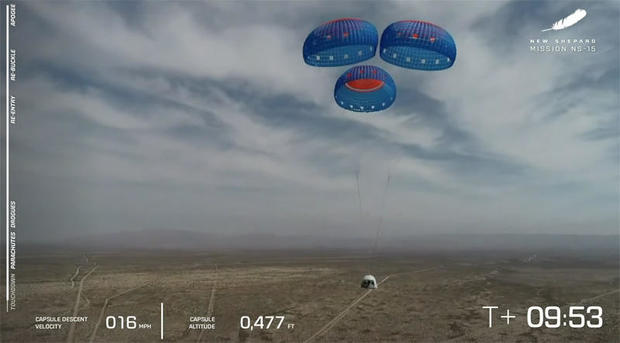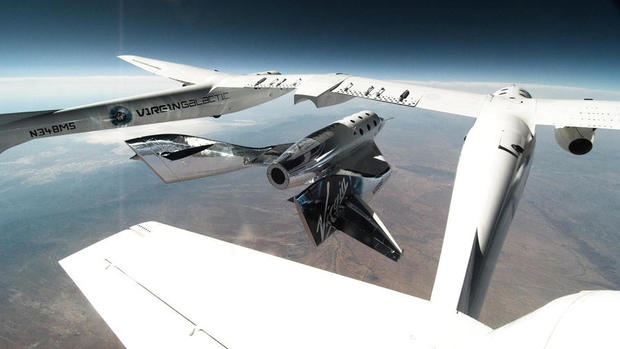Watch Live: Jeff Bezos launches to space with Blue Origin crew
get the free appAmazon and Blue Origin founder Jeff Bezos and three crewmates are blasting off into space Tuesday for a short 10-minute sub-orbital flight that the company hopes will be a giant leap forward for the business of commercial space travel.
It is the first launch of Blue Origin's New Shepard spacecraft to carry passengers after 15 successful uncrewed test flights. After liftoff from the company's West Texas launch site, it will rocket to an altitude of more than 62 miles above the Earth, where the passengers will experience about three minutes of weightlessness and stunning views out of the largest windows ever built into a space capsule before plunging back into the lower atmosphere and parachuting down to landing.
"I'm excited," Bezos said Monday in an interview with Gayle King on "CBS This Morning." "People keep asking if I'm nervous. I'm not really nervous. I'm excited. I'm curious. I want to know what we're going to learn."
"You're not nervous?" King asked. "How are you not nervous?"
"We've been training. This vehicle is ready. This crew is ready. This team is amazing," Bezos replied. "We just feel really good about it."
Joining him onboard are his brother Mark Bezos; trailblazing aviator Wally Funk, who at age 82 will be the oldest person ever to fly in space; and 18-year-old Dutch student Oliver Daemen, the first paying passenger and youngest ever to launch.
How to watch the Blue Origin space launch
- What: Jeff Bezos and three crewmates launch aboard Blue Origin's New Shepard spacecraft
- Date: Tuesday, July 20, 2021
- Time: Liftoff currently targeted for 9 a.m. EDT
- Location: Blue Origin's Launch Site One, in the desert near Van Horn, Texas
- On TV: "CBS This Morning" co-host Gayle King and "CBS Evening News" anchor Norah O'Donnell lead CBS News' Special Report on the launch — coverage begins at 8:59 a.m. EDT on your local CBS station
- Online stream: Watch live on CBSN in the video player above or on your mobile or streaming device — coverage begins at 8:15 a.m. EDT
Astronauts head to the launch pad
The crew emerged from Blue Origin's astronaut training center and climbed into an SUV for the ride to the launch pad about 45 minutes ahead of the scheduled launch time. A few minutes later they arrived and climbed the stairs to board the crew capsule.
Final preparations underway
"CBS This Morning" co-host Gayle King reports from the launch site near Van Horn, Texas, that weather conditions look good for launch Tuesday morning. Blue Origin says the crew is ready to go.
"Our astronauts have completed training and are a go for launch," the company tweeted.
"#NewShepard is on the pad. The launch team completed vehicle rollout this morning and final preparations are underway."
The launch is scheduled for a significant date in space history — the 52nd anniversary of the Apollo 11 moon landing.
New Shepard rocket designed to be "the safest human spaceflight vehicle"
When he launches into space, Jeff Bezos will be giving his company's product the ultimate endorsement: riding on a fully automated rocket that has never before carried a human to the edge of space.
"We set out to create the safest human spaceflight vehicle ever designed or built or operated," said Gary Lai, director of design for the New Shepard.
The system's safety features include three braking parachutes and thrusters to slow the capsule right before landing so it touches down at just 1 mile per hour.
"The capsule is designed to be survivable if only one of the main parachutes opens," Lai told CBS News correspondent Mark Strassmann. The system "will do its utmost to slow the vehicle down, but then there is a crushable structure at the bottom of the capsule that will absorb some of the impact, and then the seat has an energy absorption mechanism, a scissor mechanism, that then takes the astronaut and decelerates them at a safe velocity."
Another safety feature is the integrated, autonomous escape system.
Ariane Cornell, director of astronaut and orbital sales at Blue Origin, explained, "If there's any issue detected with the rocket ... we will fire this escape motor to get the capsule far and fast away from the booster."
And they've made sure it works at every stage of the mission: on the launch pad, in flight and all the way in space. In all 15 test flights, the capsule returned safely to the ground.
"There's a lot of people, hundreds of engineers over the years that have worked on this vehicle. So this is a culmination of a dream for them," Lai said.
Meet the Blue Origin crew
Jeff Bezos, the founder of Amazon and one of the wealthiest men in the world with a net worth of more than $200 billion, started Blue Origin in 2000 to turn his dream of commercial spaceflight into reality. Two decades later, he announced plans to board its first passenger flight along with his younger brother, Mark.
"Ever since I was five years old, I've dreamed of traveling to space," Bezos wrote on Instagram. "On July 20th, I will take that journey with my brother. The greatest adventure, with my best friend."
He later introduced two more crewmates: Wally Funk, a legendary pilot who was one of the 13 female fliers tested but ultimately barred from NASA's initially all-male astronaut corps in the 1960s, and teenage space enthusiast Oliver Daemen, whose family paid an undisclosed sum for his seat.
All four talked about their excitement in an interview on "CBS This Morning" the day before launch.
The flight was originally supposed to include the winner of an online auction who bid $28 million for the privilege, but that anonymous bidder had a schedule conflict and opted to join a later flight instead.
The crew was slated to undergo 14 hours of training over two days to familiarize them with the spacecraft, but they won't actually be flying it themselves — the New Shepard is fully automated, with no pilots or flight controls onboard.
Billionaire owners deny it's a "space race" as they vie for wealthy passengers
After Bezos announced his launch plans, Richard Branson, owner of the rival space company Virgin Galactic, upstaged him by lifting off on his own sub-orbital flight on July 11. But they both insist they don't view the competition as a "space race."
"I've said this so many times, it really wasn't a race," Branson said after landing. "We're just delighted that everything went so fantastically well. We wish Jeff the absolute best and the people who are going up with him during his flight."
Blue Origin, in its mission statement, says "we are not in a race" and vows to pursue its goal of "building a road to space" according to its Latin motto, Gradatim Ferociter: "Step by step, ferociously."
Yet both are looking for an edge in the emerging business of launching paying customers on short trips to space.
Virgin Galactic plans to start regular commercial operations in early 2022, and is aiming to carry out 400 flights per year from Spaceport America, its base in New Mexico. Some 600 tickets have already been sold, including to Hollywood celebrities, for prices ranging between $200,000 and $250,000. Tickets are expected to be even more expensive when they go on sale to the public.
Blue Origin has yet to announce ticket prices or a date for the start of commercial operations.
However, while the companies are enthusiastic, the idea of billionaire owners and wealthy passengers spending huge sums on space tourism has sparked some backlash.
"Jeff Bezos' 11-minute thrill ride to space is an insult to the millions of people here on planet Earth who struggle every day to feed their families and make ends meet," Oxfam America said in a statement. "Many of them are the very Amazon workers who helped make Bezos the richest man in the world."
Blue Origin vs. Virgin Galactic: How their spacecraft compare
Virgin Galactic and Blue Origin chose different routes to space.
Virgin Galactic's VSS Unity spaceplane, which carries two pilots and up to six passengers, is launched from a carrier jet that flies it up an altitude of about 45,000 feet. From there, it is released and fires its rocket engine to propel it to an altitude of a little over 50 miles above the Earth.
The crew gets to experience about three minutes of weightlessness before the spaceplane begins a spiraling descent and glides to a runway landing. Branson's flight lasted 59 minutes from takeoff to touchdown.
Blue Origin's crew capsule launches vertically atop a reusable single-stage rocket and then soars out of the lower atmosphere on its own to an altitude higher than 62 miles before arcing over and beginning a parachute descent back to Earth. The entire flight lasts about 10 minutes.
Though Blue Origin's flight is shorter, both companies offer passengers about the same amount of time in weightlessness.
NASA, the Federal Aviation Administration and the U.S. Space Force agree that space effectively begins at an altitude of 50 miles, so Branson's flight earned him his "astronaut wings."
The Fédération Aéronautique Internationale (FAI), an international body based in Switzerland that certifies aerospace records, considers an altitude of 100 kilometers, or 62 miles — a level known as the Kármán Line — as the dividing line between the discernible atmosphere and space.
Blue Origin's spacecraft is designed to reach that higher altitude, and the company boasted in a tweet: "None of our astronauts have an asterisk next to their name."
Virgin Galactic says the altitude difference is trivial and that no such "asterisk" is warranted given that NASA and other U.S. authorities all consider altitudes higher than 50 miles to be in space.



